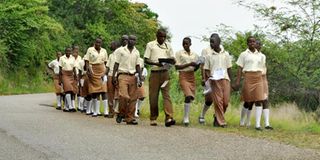1.7m fail to reach Senior Six

Statistics show that out of the 1,837,277 pupils who joined Primary One across the country in 2004, only 102,858 students appeared for the 2016 UACE. Photo by Rachel Mabala
What you need to know:
- Ms Goretti Nakabugo, the Uwezo country director, said the ministry lacks reliable data on which people can track who joined the education system and left.
- Uwezo reports in the last six years have indicated that many children reach primary seven but have difficulties in answering Primary Two level arithmetic and literacy questions.
KAMPALA. Nine in every 10 pupils who enrolled in Primary One in 2004 didn’t make it to Senior Six last year, the last level of secondary education.
Statistics obtained from the ministry of Education show that in 2004, a total of 1,837,277 pupils joined Primary One across the country.
Thirteen years later, these had dropped to 102,858 students who appeared for Uganda Advanced Certificate of Education (UACE) in 2016, according to Uganda National Examinations Board (Uneb) report.
This means that 1,734,419 were unaccounted for when Uneb released UACE examinations this week, representing 94.4 per cent school dropout.
Uneb statistics also show that when this lot sat Primary Leaving Examinations (PLE) in 2010, about 512,057 candidates had registered but 20,000 of these didn’t appear for the examination.
The transition to O-Level was ugly too in 2014, where Uneb recorded 304,189 students sitting Uganda Certificate of Education (UCE). The numbers dropped further at Uganda Advanced Certificate of Education (UACE) where out of 104,243 who registered for the examination last year, only 102,858 appeared.
While there are several reasons fronted for the unaccounted for children at various levels, it is still a puzzle for the ministry to account for pupils who leave before completing Primary Seven, the first education cycle.
For instance, a total of 1,325,220 pupils didn’t sit PLE and yet with the government universal education programme, no child is expected to repeat a class. There are no alternatives at this stage to absorb any child who leaves school without a primary certificate.
Those with a PLE certificate but for one reason or the other can’t continue to secondary have options in technical institutes and farm schools, while Senior Four leavers can go to Primary Teachers Colleges (PTCs) or nursing institutions.
Uganda National Teachers Union (Unatu) wants the ministry to explain where these children are and account for the capitation grant government has released to maintain them in a system they are not in.
“The ministry must answer this question. They have deliberately refused to give children a computerised number for tracking them wherever they go because they know what they are hiding. If you look at the expenditure and the capitation grant, you will be shocked,” Mr James Tweheyo, the Unatu general secretary, said.
But Ms Rosemary Nansubuga Seninde, the State minister for Primary Education, said government is not seated back but also wondering where these children could be. She appreciated that there are alternatives at different levels of education but admitted that the transition rate still leaves many children unaccounted for.
For a start, Ms Seninde said their proposal to have every child in school get a national identification number is still before Cabinet waiting for approval.
“Where are those other children? We are also wondering what the problem could be. We have been wondering on the issue of ghost students; could it be that those who dropped out were ghosts. We also appreciate that there are those who have left because of lack of feeding, while girl children get pregnant and leave school,” Ms Seninde said in an interview.
She added: “As a ministry, we are coming up with a strategy to help us trace where our children are. Every child will get a national identification number and this will help us trace them because you just enter the number into the system and it tells you all the details of that child. This will help fight ghosts, and we will be able to follow them up. We are waiting for Cabinet to approve this and once approved, we are ready to start. It has some financial implications but government will handle.”
Ministry blamed
Ms Goretti Nakabugo, the Uwezo country director, said the ministry lacks reliable data on which people can track who joined the education system and left. Her biggest worry, though, is whether these children who manage to complete leave the system with employable skills.
“It is hard to track the dropout because there is no reliable data from the ministry. You might find some of these children have gone to other forms of education, whether formal or non-formal. Some could have repeated but many, I am sure, have dropped out. There is a lot of wastage in the system. Education is one area where we cry of a constrained resource. We have little but even with this little, we can’t utilise it,” Ms Nakabugo said.
Their reports in the last six years have indicated that many children reach primary seven but have difficulties in answering Primary Two level arithmetic and literacy questions.
For example, their findings contained in the 2014 report indicated that only two pupils out of 10 in Primary Seven were able to solve Primary Two numeracy questions.



